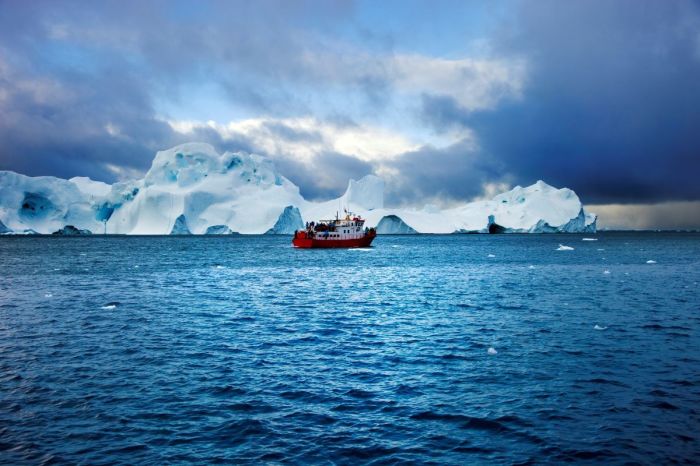Should Trump try to buy Greenland? Land with dark birth control history

As winter cold grips much of the mainland United States, thoughts have suddenly turned to an even colder place, the massive island straddling the Arctic Circle to our northeast. Thanks to a series of comments by President-elect Donald Trump over Christmas, Greenland is, well, a hot topic.
The theme is whether the United States should purchase Greenland, which has been for centuries, under various legal statuses, a part of the kingdom of Denmark. There is much to discuss regarding this bold proposition, including the views of the people of Greenland and Denmark, but there is also this to know: Greenland is in the midst of a profound human rights dispute with the Danish government over, of all things, coercive population control.
That might take a second reading. Yes, Greenland is among the least populated places on the planet. In recent years, however, it has come to light that the Danish government devised and implemented a campaign of abortion followed by the insertion of Lippes Loop intrauterine devices (IUDs) in as many as half of Greenland’s population of 9,000 Inuit women of childbearing age. The main events seem to have happened in the 1960s and 1970s, an era in which the global population control movement acquired massive momentum and scope. The Nixon-era Rockefeller Commission on Population Growth and the American Future released its landmark report in 1972, for example, calling for the legalization of abortion, sex education, and distribution of contraceptives to minors to stave off the growing number of people resulting from improved health and lifespans.
U.S. interest in acquiring Arctic territories has a long history, of course, dating back to the 19th century and the inaptly named Seward’s Folly, under which the United States paid Russia $7.2 million — that is, roughly two cents per acre — for Alaska. On December 22, 2024, President-elect Trump wrote of Greenland on his site Truth Social, “For purposes of National Security and Freedom throughout the World, the United States of America feels that the ownership and control of Greenland is an absolute necessity.” The Prime Minister of Greenland, Mute Egede, chairman of the country’s largest party, the Inuit Ataqatigiit, seems to differ. He responded at length on January 3, asserting that not only was Greenland not for sale but that it would continue to seek independence from Denmark. “The Greenlandic people’s opportunity for independence has been adopted through the provisions of the Self-Government Act, thereby creating a legal basis for how independence can be achieved,” he said.
News stories about Greenland’s move for independence acknowledge the role played by its revolt against Denmark’s involuntary birth control crimes, which some Greenlandic leaders have labeled genocide. Meanwhile, reports say that Donald Trump, Jr. has landed in Greenland in pursuit of the acquisition. Greenland’s leadership seems more excited at the moment by news of gaining its own international airport since entrée to the island now requires passage through Denmark and the island wants to be its own destination. President-elect Trump surmises that Greenland is MAGA territory and pledges that the United States will “protect” and “cherish” it.
Greenland has every right to be skeptical of the paternalistic aims of the secular West, as the coercive population control scandal shows. Investigation of the crimes is now in the hands of the Danish government after their existence was exposed in Facebook posts in 2017 by an Inuit activist named Naja Lyberth. Lyberth, a psychologist, was age 13 in 1976 when a doctor advised her during a routine medical examination at school to go to the hospital, where she was fitted for an IUD.
Demonstrating the power of social media, Lyberth swiftly heard from other women and formed a Facebook group to share their experiences (a similar pathway followed by women who successfully campaigned in the United States to drive the sterilization device Essure off the market). Lyberth’s account inspired more stories about what has become colloquially known as the “spiral” or “coil campaign,” with reports appearing in the BBC, The New York Times, and elsewhere.
Finally, in September 2022 the Danish government agreed to conduct an investigation into how the program came to be. The investigation is to last two years and a report is due in May 2025. Concerns have already been expressed, however, about the fact that the inquiry will only cover the period from the program’s inception until 1991, when Greenland acquired management of its health care system. Reports from individual Inuit women document that unlawful insertion of IUDs continued after 1991. Accounts of women and girls suffering intense pain, being sterilized, and losing sexual function and other lifelong harms have proliferated. “So many women contact me,” Nyberth says. “It seems that the younger the girls were, the more complications they get from this coil. It’s so sad.”
In March of last year, 143 indigenous Inuit women filed suit against Denmark over the compulsory birth control inflicted upon them. The women are seeking an average of $44,000 — a very low sum under the circumstances — for the injuries they suffered. Some of the women are now age 80 or over and cannot afford to wait for the outcome of the government inquiry. Although the Associated Press article on the device describes it as preventing conception, its mode of action (the creation of an inflammatory response around the cervix) means it has abortifacient properties as well. Getting at the truth and getting it out the door on these matters, embarrassing as they are to “progressive” forces, is not an assured outcome.
Some of the women report that they were subjected to the device without their knowledge after having abortions. The abortion rate in Greenland is tragically high, and the annual toll may be nearly as high as total births there. Western nations that value human life and respect women could clearly be doing more to promote quality maternity care in a country with such unique challenges in the health sector. The United States can and should be a proponent of new approaches given our own history of promulgating eugenics and coercive measures against vulnerable populations.
Even Planned Parenthood of Ottawa has now published recognition of the role of eugenics in Western population and birth control campaigns. Some Planned Parenthood agencies, after long denials or silence, have regretted and renounced this aspect of Margaret Sanger’s work and philosophy, which one leader in New York termed her “racist legacy.” Changes in the group’s targeting and abortion practices, however, are hard to discern. The most recent report, by Tessa Longbons of the Charlotte Lozier Institute, notes that in 2021 the non-Hispanic black abortion rate in New York City “was 38.6 abortions per 1,000 women ages 15 to 44, six times the non-Hispanic white rate of 6.6.”
Across the Western world, some degree of reckoning seems to be afoot for actions that contravened the most basic human rights. In Britain, interest is surging to account for mass crimes against teenage girls by pedophilic rapists. It appears that, to paraphrase Shakespeare, something was indeed rotten in both Rotherham and the state of Denmark. The Danish investigation due this coming spring should not be the end of the inquiry but the beginning, including as it almost surely will the ideology of eugenics, the obsessions of population control enthusiasts who somehow concluded there were too many children in Greenland, and the corruption of medical authorities whose deeds betrayed Hippocratic norms.
Wariness about Denmark’s follow-up is warranted, given the relative lack of public notice of the Greenland crimes and the lack of interest among some Western powers in the continuing damage done by the People’s Republic of China’s mandatory one-child policy and forced birth control and abortion practices. A look at the U.S. Department of State’s latest Country Report on Human Rights Practices, from April 2024, reveals only this bland assertion concerning Denmark: “In May, the Ministry of Health announced that a team of researchers led by Ilisimatusarfik’s Center for Arctic Welfare in Greenland and the Center for Public Health in Greenland at the University of Southern Denmark would investigate the intrauterine device (IUD) case in which Greenlandic Inuit women and girls had IUDs inserted, many without consent, from the 1960s to 1991.”
No mention is made of the report due this coming May or of the magnitude — affecting half of all Inuit women — of the violations that have been reported.
As always, these occasions remind us of the need for vigilance when countries lose fundamental respect for the value of all human life. The apparent desire of Greenland to direct its own future course and not be subject to the geopolitical ideologies of a European government, or the security interests of an American administration, are all the more understandable given this history. Human rights do not exist to be bought and sold. People are not pawns in some global game of chess — or finance.
Originally published at The Washington Stand.
Chuck Donovan served in the Reagan White House as a senior writer and as Deputy Director of Presidential Correspondence until early 1989. He was executive vice president of Family Research Council, a senior fellow at The Heritage Foundation, and founder/president of Charlotte Lozier Institute from 2011 to 2024. He has written and spoken extensively on issues in life and family policy.




























